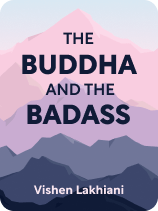

This article is an excerpt from the Shortform book guide to "The Buddha and the Badass" by Vishen Lakhiani. Shortform has the world's best summaries and analyses of books you should be reading.
Like this article? Sign up for a free trial here.
What is anti-hustle culture? How is modern work ruining our drive to succeed?
In The Buddha and the Badass, Vishen Lakhiani claims that hustling won’t get your business anywhere. In fact, he proposes an “anti-hustle culture” that combines spiritual enlightenment with disruptive leadership.
Continue reading to learn more about Lakhiani’s anti-hustle culture.
The Problem With Modern Work: Hustle Culture
Before getting into why anti-hustle culture works, we need to understand why hustle culture doesn’t work. Lakhiani writes that our vision of success in life is based on false information we’re fed from an early age: that you must work harder than everyone else, that you should try to make as much money as possible, and that your personal life must be sacrificed for your professional life. In other words, to be successful, you must hustle.
(Shortform note: While the belief in hard work may have always been around, its manifestation as hustle culture only came about during the rise of the tech industry. Tech leaders promoted and continue to promote the idea that to achieve anything worthwhile, you must work long and hard and that doing anything else with your time is wasteful.)
However, he argues this simply isn’t true: Success does not require laborious work and long hours. And in fact, this misconception makes people 1) unhappy in life because they don’t have time for the people and activities they enjoy and 2) ineffective at work because they’re too busy to recognize if they’re striving for the right goals or if their work is actually helping anyone.
(Shortform note: The effects of the misguided belief in hustle culture can be summed up as burnout. Burnout is defined as a state of exhaustion and reduced productivity accompanied by a loss of your sense of self. Burnout can be caused by factors other than hustle culture: Sometimes, just being unclear on the expectations of your role can make you feel burned out.)
A Better Way to Work: Be Enlightened and Disruptive
According to Lakhiani, to have success at work and in life, you must shed your belief in “hustle culture” and develop a new, dual approach to work: Be both spiritually enlightened and disruptive of workplace norms. This is what Lakhiani refers to as being both a Buddha and a badass. When you’re both enlightened and disruptive, you work effortlessly—as if it was for fun. You’re also a great team player, excel in your roles, are universally loved, and can handle multiple responsibilities and tasks. You seem to be lucky and in good health and happiness all the time. In short, life and work are easy and enjoyable.
(Shortform note: Lakhiani’s description of an enlightened and disruptive leader might seem idealistic: Can anyone really have such a blessed life? Even if you’re extraordinarily lucky, you’re bound to run into setbacks at some point. Perhaps it would be more realistic to additionally describe an enlightened and disruptive person as being resilient. If you’re resilient, even when you run into inevitable setbacks, you maintain your effortless and positive approach to life by adapting to and bouncing back from them. Resilience also helps you grow personally, which is necessary to continue to be a good team player and to excel: If you’re not growing and learning, eventually, your methods will become outdated, and you’ll be outperformed.)
What Does “Enlightened” Mean?
As Lakhiani describes it, being enlightened means being calm and wise. You’re OK not knowing all the answers and you don’t need a concrete path to follow. You allow the Universe—or whatever higher power you believe in—to help you, rather than forcing events and outcomes.
(Shortform note: In Buddhist philosophy—which Lakhiani sometimes draws upon—through enlightenment, you attain nirvana, which is a state free from suffering, greed, anger, and delusion. While centeredness, flexibility, and wisdom can help you attain this Buddhist form of enlightenment, Buddhists don’t believe in a higher power or God, so that part of Lakhiani’s definition of enlightenment is his own.)
What Does “Disruptive” Mean?
When you’re disruptive, you challenge the idea that to succeed, you must work tirelessly. By doing so, you enact positive change for employees and colleagues. A disruptive leader treats each employee as an autonomous being with personal aspirations, which makes work feel fulfilling, turning it into an opportunity for growth and connection.
When it comes to making change through disruption, Lakhiani mainly addresses leaders because they have the ability to change the workplace more than lower-level employees do. But he adds that anyone can be disruptive and make work better for those around them.
(Shortform note: There’s good reason to disrupt workplace norms and build a positive work environment: According to the authors of First, Break All the Rules, only 13% of global employees are engaged at work. The main reason for this low number is that workers have poor or even hostile relationships with their managers. If you’re a leader, you’re in the best position to mend those relationships by treating people fairly and kindly, thereby boosting engagement at work.)

———End of Preview———
Like what you just read? Read the rest of the world's best book summary and analysis of Vishen Lakhiani's "The Buddha and the Badass" at Shortform.
Here's what you'll find in our full The Buddha and the Badass summary:
- Why you don't need to work long, grueling hours to be successful
- How to transform your workplace from mundane to fun
- How to merge spiritual enlightenment with disruption






